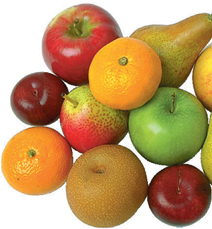The key to eating well in pregnancy is to keep things simple while keeping an eye on your nutrient intake. Malaysians have a huge advantage when it comes to food: a wide variety of nutritious foods from different cultures is easily available. This gives you better chances of getting the amounts you need of each nutrient, because no one food offers all you need. Before you become pregnant, have a chat with your obstetrician or dietitian about your diet, so they can prescribe supplements to you if necessary. If you are already pregnant, it’s even more important for you to get regular nutritional advice on your diet.
Breakfast
Breakfast is the most important meal of the day. It is also the meal most frequently missed due to busy schedules. Before you go about your daily routine, your body needs food to give it energy.
The ideal breakfast should be big enough for you to feel satisfied until around noon, and light enough for you not to feel drowsy or heavy after eating. Here are some good breakfast foods:
- Dry cereal (eg cornflakes, muesli)
- Wet cereal (eg oatmeal) with low fat/skimmed milk
- Wholemeal breads/biscuits
- Noodle soup (eg kuay teow soup with lean chicken and fish cake, soto ayam, laksa asam)
- Chapati/tosay with dhal
- Rice porridge (eg congee or bubur)
- Fresh fruits & juices
Nasi lemak and roti canai are among the popular traditional breakfast foods, but it’s not advisable for you to eat this dish more than once or twice a week because of the amount of fat in the rice and roti canai, as well as accompanying dishes.
Healthful Snacks
If you feel hungry between meals, choose nutritious snacks such as fresh fruits and vegetables, low-fat yoghurt and cereals.

Traditional desserts such as bubur gandum (wheat porridge) and tau foo fah are also good choices, as long as they are lightly sweetened and preferably without coconut milk. Quench your thirst with low fat or skim milk, fortified soya bean milk and plenty of water.
Plan Your Menus Ahead
Planning the whole week’s menus beforehand may sound like a lot of work, but it has its benefits. They include:
- Ensuring that your diet over the whole week is balanced
- Planning for a varied and interesting diet which covers all the essential nutrients
- Knowing ahead of time what ingredients to buy
- Saving time on deciding what to eat at each meal
Before you begin to plan your week’s menu, consider the following 3 steps:
- Know your needs. How much of each type of food did you need before pregnancy? Did you consistently meet them? Have your needs of certain types of food increased now that you’re pregnant?
- Plan to meet those needs. Write down what your needs are, including how they’ve changed in pregnancy. Then plan to eat foods that give you your daily requirement of each one.
- Meet those needs. It takes some adjustment to stick to a planned menu, but this is one sure way to make sure you get exactly the nutrients that you need.



Comments